Political Science Assignment: Civil Liberties and the US Constitution
VerifiedAdded on 2020/04/01
|8
|1788
|46
Essay
AI Summary
This essay provides an overview of civil liberties in the United States, focusing on the rights guaranteed by the Constitution and interpreted by the Supreme Court. It explores the concept of the Bill of Rights, its nationalization through the Fourteenth Amendment, and the debate over whether federal courts should impose single standards for all states. The essay examines specific freedoms, including religion, speech, press, and the right to bear arms, highlighting controversies and debates surrounding each. It further discusses controversial civil liberties like freedom of the press and analyzes rights guaranteed in the Fourth, Fifth, Sixth, and Eighth Amendments, including protection against unreasonable search and seizure, self-incrimination, right to counsel, and freedom from cruel and unusual punishment. The evolution of the right to privacy over the past 90 years is examined, along with the challenges posed by technological advancements. The essay concludes with a reflection on the future of civil liberties, emphasizing the importance of balancing privacy with national security concerns.

Political science 1
Name
Couse
Professor
Date
Name
Couse
Professor
Date
Paraphrase This Document
Need a fresh take? Get an instant paraphrase of this document with our AI Paraphraser
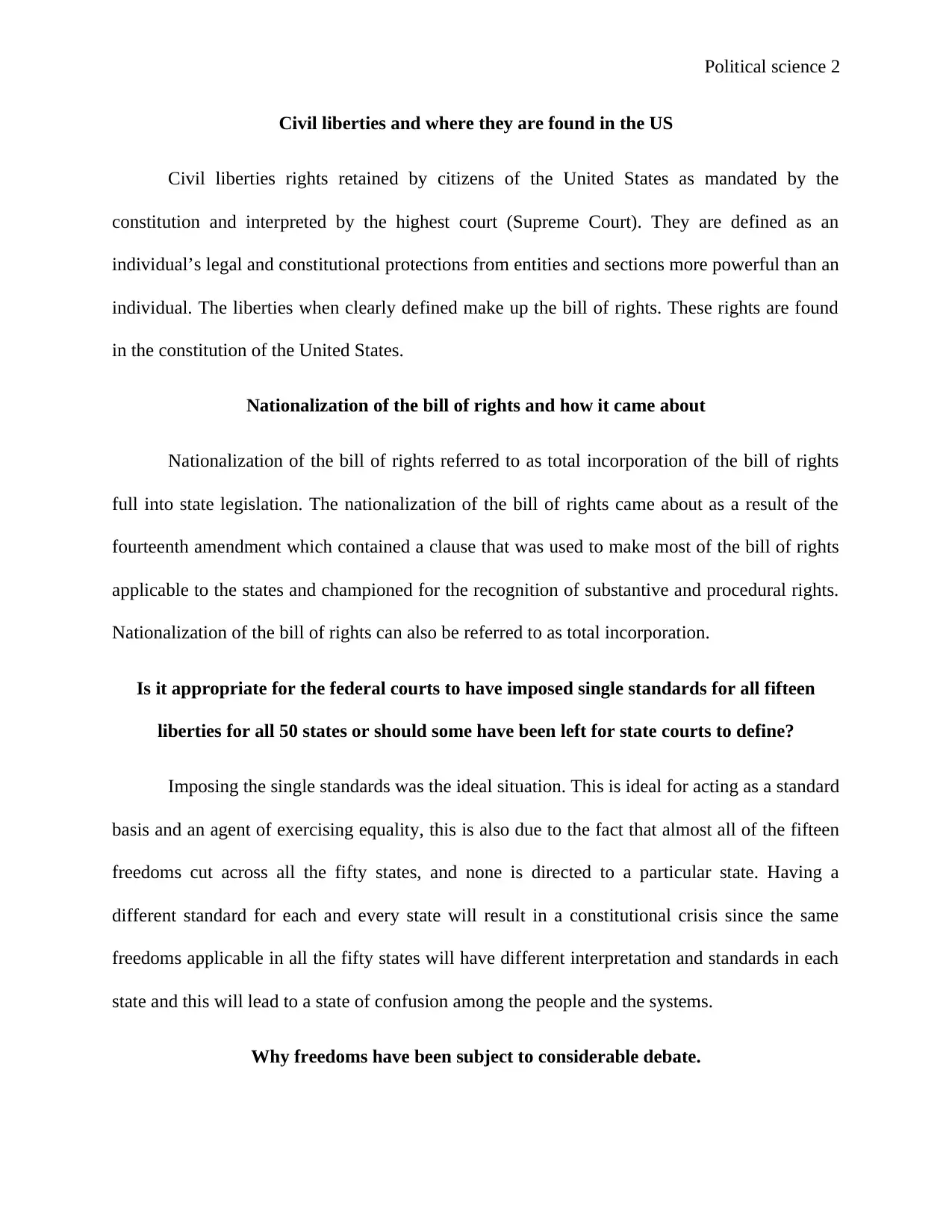
Political science 2
Civil liberties and where they are found in the US
Civil liberties rights retained by citizens of the United States as mandated by the
constitution and interpreted by the highest court (Supreme Court). They are defined as an
individual’s legal and constitutional protections from entities and sections more powerful than an
individual. The liberties when clearly defined make up the bill of rights. These rights are found
in the constitution of the United States.
Nationalization of the bill of rights and how it came about
Nationalization of the bill of rights referred to as total incorporation of the bill of rights
full into state legislation. The nationalization of the bill of rights came about as a result of the
fourteenth amendment which contained a clause that was used to make most of the bill of rights
applicable to the states and championed for the recognition of substantive and procedural rights.
Nationalization of the bill of rights can also be referred to as total incorporation.
Is it appropriate for the federal courts to have imposed single standards for all fifteen
liberties for all 50 states or should some have been left for state courts to define?
Imposing the single standards was the ideal situation. This is ideal for acting as a standard
basis and an agent of exercising equality, this is also due to the fact that almost all of the fifteen
freedoms cut across all the fifty states, and none is directed to a particular state. Having a
different standard for each and every state will result in a constitutional crisis since the same
freedoms applicable in all the fifty states will have different interpretation and standards in each
state and this will lead to a state of confusion among the people and the systems.
Why freedoms have been subject to considerable debate.
Civil liberties and where they are found in the US
Civil liberties rights retained by citizens of the United States as mandated by the
constitution and interpreted by the highest court (Supreme Court). They are defined as an
individual’s legal and constitutional protections from entities and sections more powerful than an
individual. The liberties when clearly defined make up the bill of rights. These rights are found
in the constitution of the United States.
Nationalization of the bill of rights and how it came about
Nationalization of the bill of rights referred to as total incorporation of the bill of rights
full into state legislation. The nationalization of the bill of rights came about as a result of the
fourteenth amendment which contained a clause that was used to make most of the bill of rights
applicable to the states and championed for the recognition of substantive and procedural rights.
Nationalization of the bill of rights can also be referred to as total incorporation.
Is it appropriate for the federal courts to have imposed single standards for all fifteen
liberties for all 50 states or should some have been left for state courts to define?
Imposing the single standards was the ideal situation. This is ideal for acting as a standard
basis and an agent of exercising equality, this is also due to the fact that almost all of the fifteen
freedoms cut across all the fifty states, and none is directed to a particular state. Having a
different standard for each and every state will result in a constitutional crisis since the same
freedoms applicable in all the fifty states will have different interpretation and standards in each
state and this will lead to a state of confusion among the people and the systems.
Why freedoms have been subject to considerable debate.
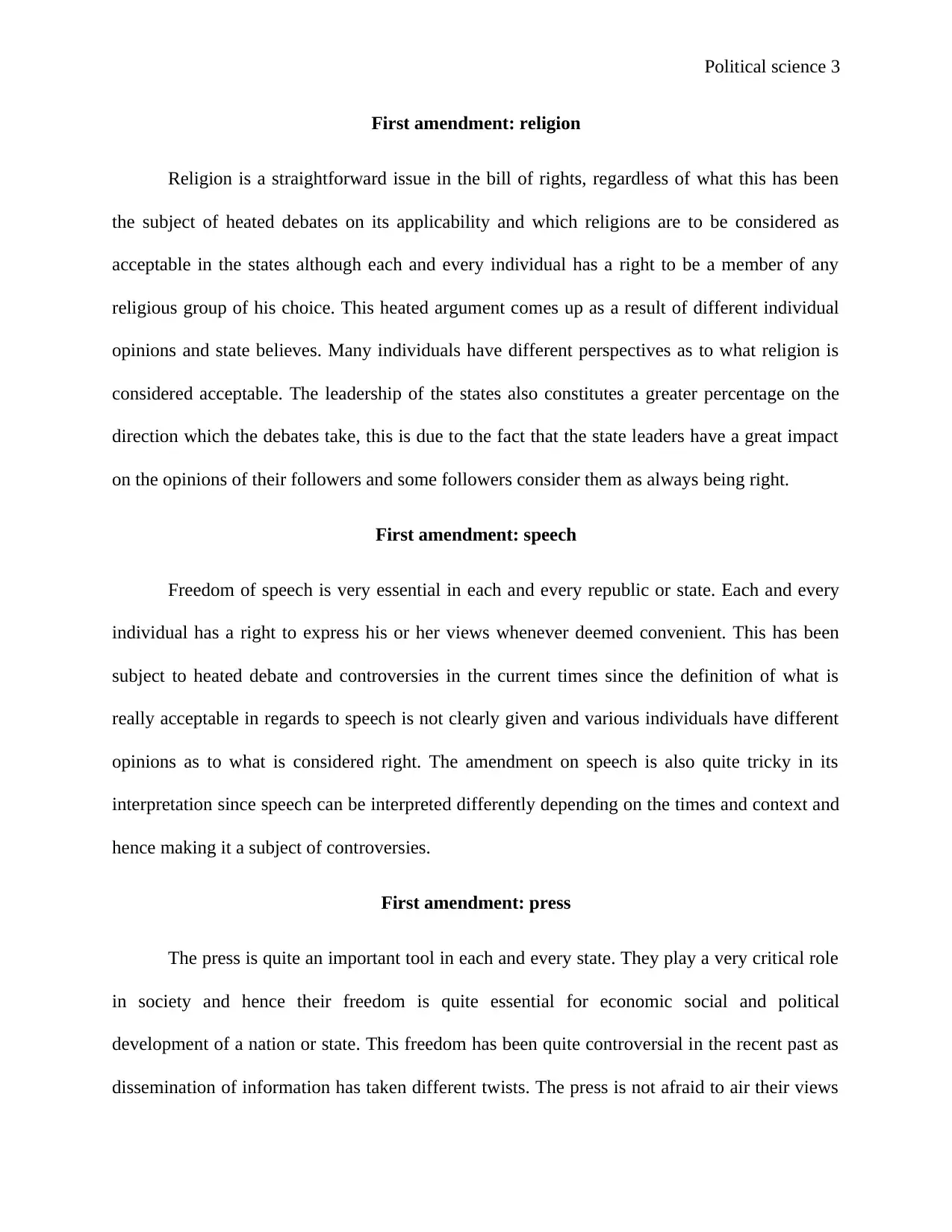
Political science 3
First amendment: religion
Religion is a straightforward issue in the bill of rights, regardless of what this has been
the subject of heated debates on its applicability and which religions are to be considered as
acceptable in the states although each and every individual has a right to be a member of any
religious group of his choice. This heated argument comes up as a result of different individual
opinions and state believes. Many individuals have different perspectives as to what religion is
considered acceptable. The leadership of the states also constitutes a greater percentage on the
direction which the debates take, this is due to the fact that the state leaders have a great impact
on the opinions of their followers and some followers consider them as always being right.
First amendment: speech
Freedom of speech is very essential in each and every republic or state. Each and every
individual has a right to express his or her views whenever deemed convenient. This has been
subject to heated debate and controversies in the current times since the definition of what is
really acceptable in regards to speech is not clearly given and various individuals have different
opinions as to what is considered right. The amendment on speech is also quite tricky in its
interpretation since speech can be interpreted differently depending on the times and context and
hence making it a subject of controversies.
First amendment: press
The press is quite an important tool in each and every state. They play a very critical role
in society and hence their freedom is quite essential for economic social and political
development of a nation or state. This freedom has been quite controversial in the recent past as
dissemination of information has taken different twists. The press is not afraid to air their views
First amendment: religion
Religion is a straightforward issue in the bill of rights, regardless of what this has been
the subject of heated debates on its applicability and which religions are to be considered as
acceptable in the states although each and every individual has a right to be a member of any
religious group of his choice. This heated argument comes up as a result of different individual
opinions and state believes. Many individuals have different perspectives as to what religion is
considered acceptable. The leadership of the states also constitutes a greater percentage on the
direction which the debates take, this is due to the fact that the state leaders have a great impact
on the opinions of their followers and some followers consider them as always being right.
First amendment: speech
Freedom of speech is very essential in each and every republic or state. Each and every
individual has a right to express his or her views whenever deemed convenient. This has been
subject to heated debate and controversies in the current times since the definition of what is
really acceptable in regards to speech is not clearly given and various individuals have different
opinions as to what is considered right. The amendment on speech is also quite tricky in its
interpretation since speech can be interpreted differently depending on the times and context and
hence making it a subject of controversies.
First amendment: press
The press is quite an important tool in each and every state. They play a very critical role
in society and hence their freedom is quite essential for economic social and political
development of a nation or state. This freedom has been quite controversial in the recent past as
dissemination of information has taken different twists. The press is not afraid to air their views
⊘ This is a preview!⊘
Do you want full access?
Subscribe today to unlock all pages.

Trusted by 1+ million students worldwide
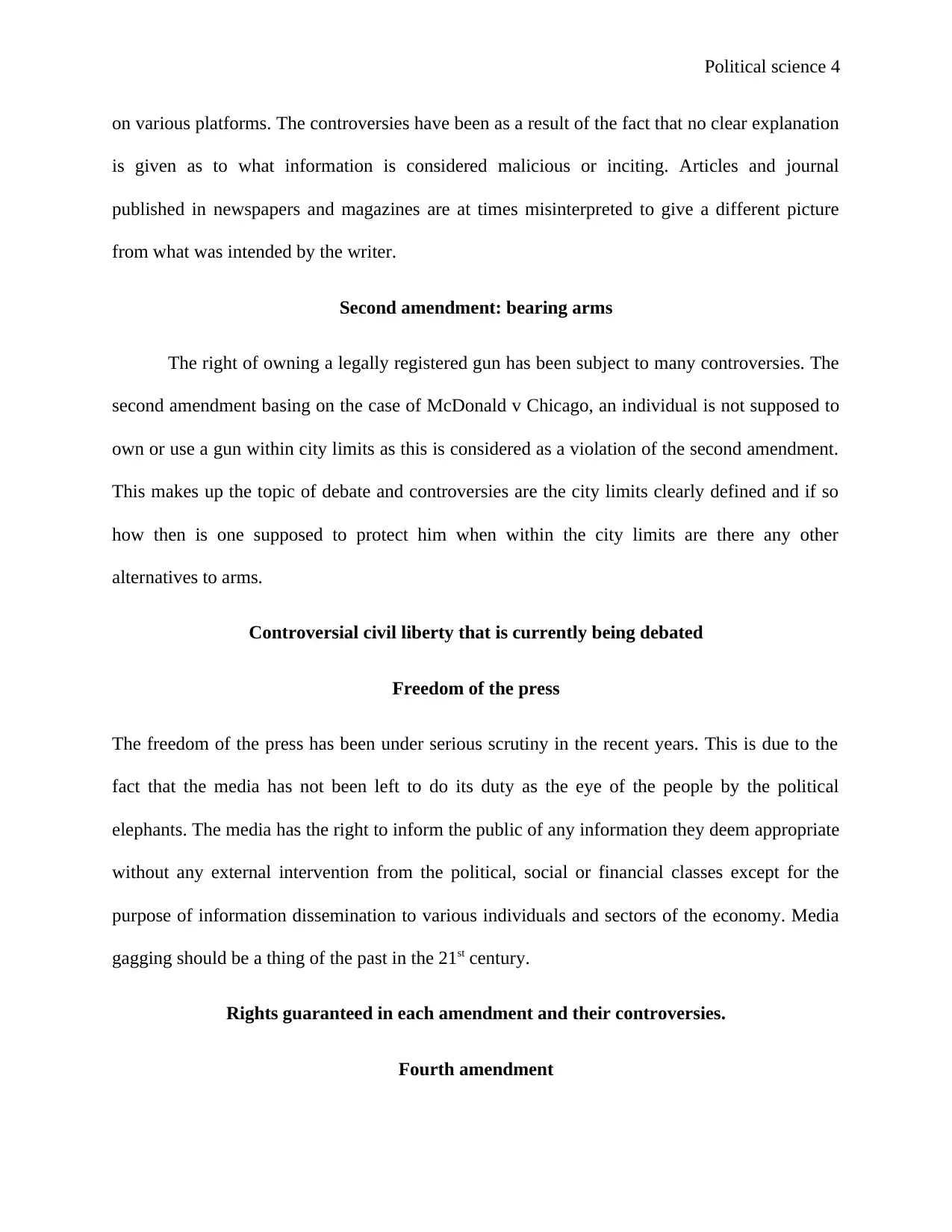
Political science 4
on various platforms. The controversies have been as a result of the fact that no clear explanation
is given as to what information is considered malicious or inciting. Articles and journal
published in newspapers and magazines are at times misinterpreted to give a different picture
from what was intended by the writer.
Second amendment: bearing arms
The right of owning a legally registered gun has been subject to many controversies. The
second amendment basing on the case of McDonald v Chicago, an individual is not supposed to
own or use a gun within city limits as this is considered as a violation of the second amendment.
This makes up the topic of debate and controversies are the city limits clearly defined and if so
how then is one supposed to protect him when within the city limits are there any other
alternatives to arms.
Controversial civil liberty that is currently being debated
Freedom of the press
The freedom of the press has been under serious scrutiny in the recent years. This is due to the
fact that the media has not been left to do its duty as the eye of the people by the political
elephants. The media has the right to inform the public of any information they deem appropriate
without any external intervention from the political, social or financial classes except for the
purpose of information dissemination to various individuals and sectors of the economy. Media
gagging should be a thing of the past in the 21st century.
Rights guaranteed in each amendment and their controversies.
Fourth amendment
on various platforms. The controversies have been as a result of the fact that no clear explanation
is given as to what information is considered malicious or inciting. Articles and journal
published in newspapers and magazines are at times misinterpreted to give a different picture
from what was intended by the writer.
Second amendment: bearing arms
The right of owning a legally registered gun has been subject to many controversies. The
second amendment basing on the case of McDonald v Chicago, an individual is not supposed to
own or use a gun within city limits as this is considered as a violation of the second amendment.
This makes up the topic of debate and controversies are the city limits clearly defined and if so
how then is one supposed to protect him when within the city limits are there any other
alternatives to arms.
Controversial civil liberty that is currently being debated
Freedom of the press
The freedom of the press has been under serious scrutiny in the recent years. This is due to the
fact that the media has not been left to do its duty as the eye of the people by the political
elephants. The media has the right to inform the public of any information they deem appropriate
without any external intervention from the political, social or financial classes except for the
purpose of information dissemination to various individuals and sectors of the economy. Media
gagging should be a thing of the past in the 21st century.
Rights guaranteed in each amendment and their controversies.
Fourth amendment
Paraphrase This Document
Need a fresh take? Get an instant paraphrase of this document with our AI Paraphraser
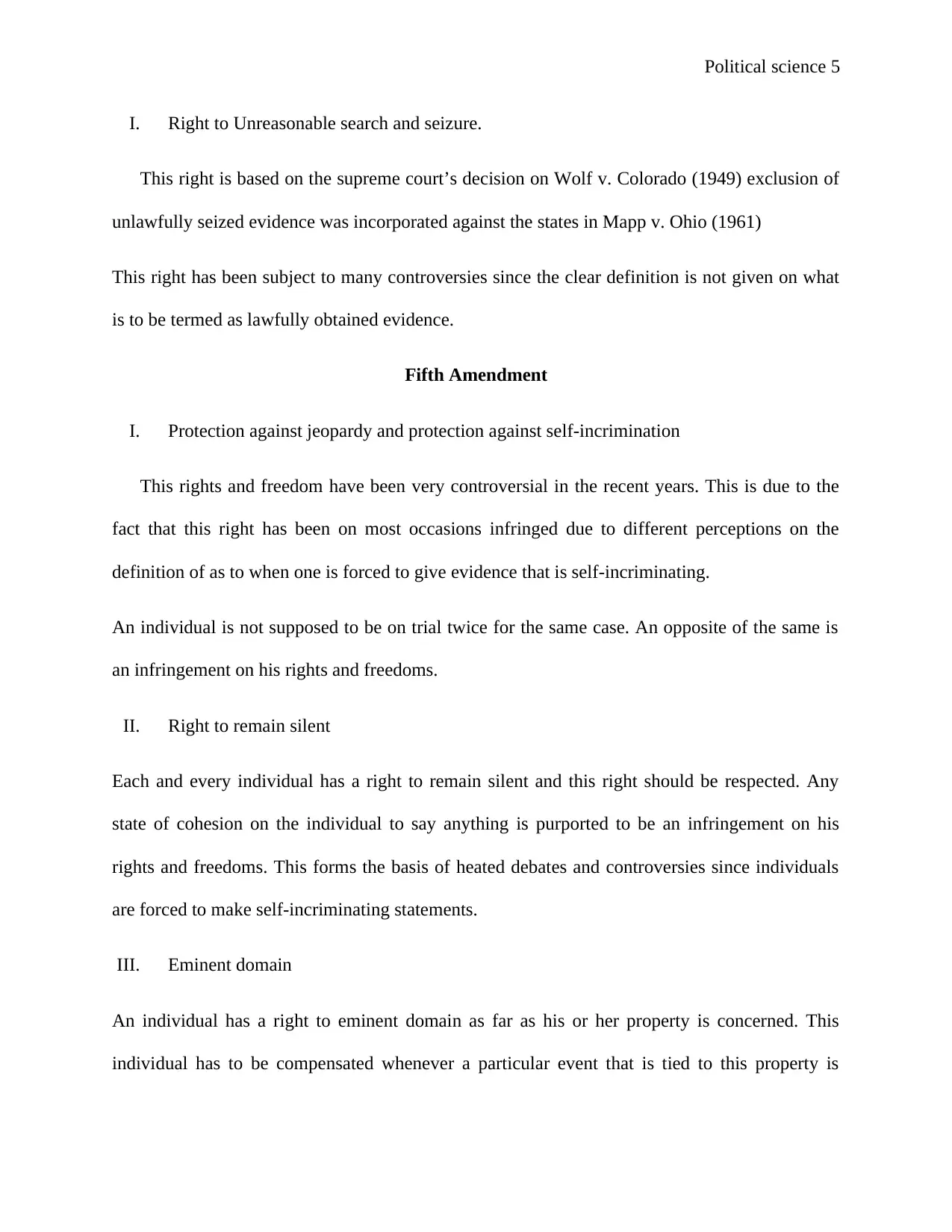
Political science 5
I. Right to Unreasonable search and seizure.
This right is based on the supreme court’s decision on Wolf v. Colorado (1949) exclusion of
unlawfully seized evidence was incorporated against the states in Mapp v. Ohio (1961)
This right has been subject to many controversies since the clear definition is not given on what
is to be termed as lawfully obtained evidence.
Fifth Amendment
I. Protection against jeopardy and protection against self-incrimination
This rights and freedom have been very controversial in the recent years. This is due to the
fact that this right has been on most occasions infringed due to different perceptions on the
definition of as to when one is forced to give evidence that is self-incriminating.
An individual is not supposed to be on trial twice for the same case. An opposite of the same is
an infringement on his rights and freedoms.
II. Right to remain silent
Each and every individual has a right to remain silent and this right should be respected. Any
state of cohesion on the individual to say anything is purported to be an infringement on his
rights and freedoms. This forms the basis of heated debates and controversies since individuals
are forced to make self-incriminating statements.
III. Eminent domain
An individual has a right to eminent domain as far as his or her property is concerned. This
individual has to be compensated whenever a particular event that is tied to this property is
I. Right to Unreasonable search and seizure.
This right is based on the supreme court’s decision on Wolf v. Colorado (1949) exclusion of
unlawfully seized evidence was incorporated against the states in Mapp v. Ohio (1961)
This right has been subject to many controversies since the clear definition is not given on what
is to be termed as lawfully obtained evidence.
Fifth Amendment
I. Protection against jeopardy and protection against self-incrimination
This rights and freedom have been very controversial in the recent years. This is due to the
fact that this right has been on most occasions infringed due to different perceptions on the
definition of as to when one is forced to give evidence that is self-incriminating.
An individual is not supposed to be on trial twice for the same case. An opposite of the same is
an infringement on his rights and freedoms.
II. Right to remain silent
Each and every individual has a right to remain silent and this right should be respected. Any
state of cohesion on the individual to say anything is purported to be an infringement on his
rights and freedoms. This forms the basis of heated debates and controversies since individuals
are forced to make self-incriminating statements.
III. Eminent domain
An individual has a right to eminent domain as far as his or her property is concerned. This
individual has to be compensated whenever a particular event that is tied to this property is
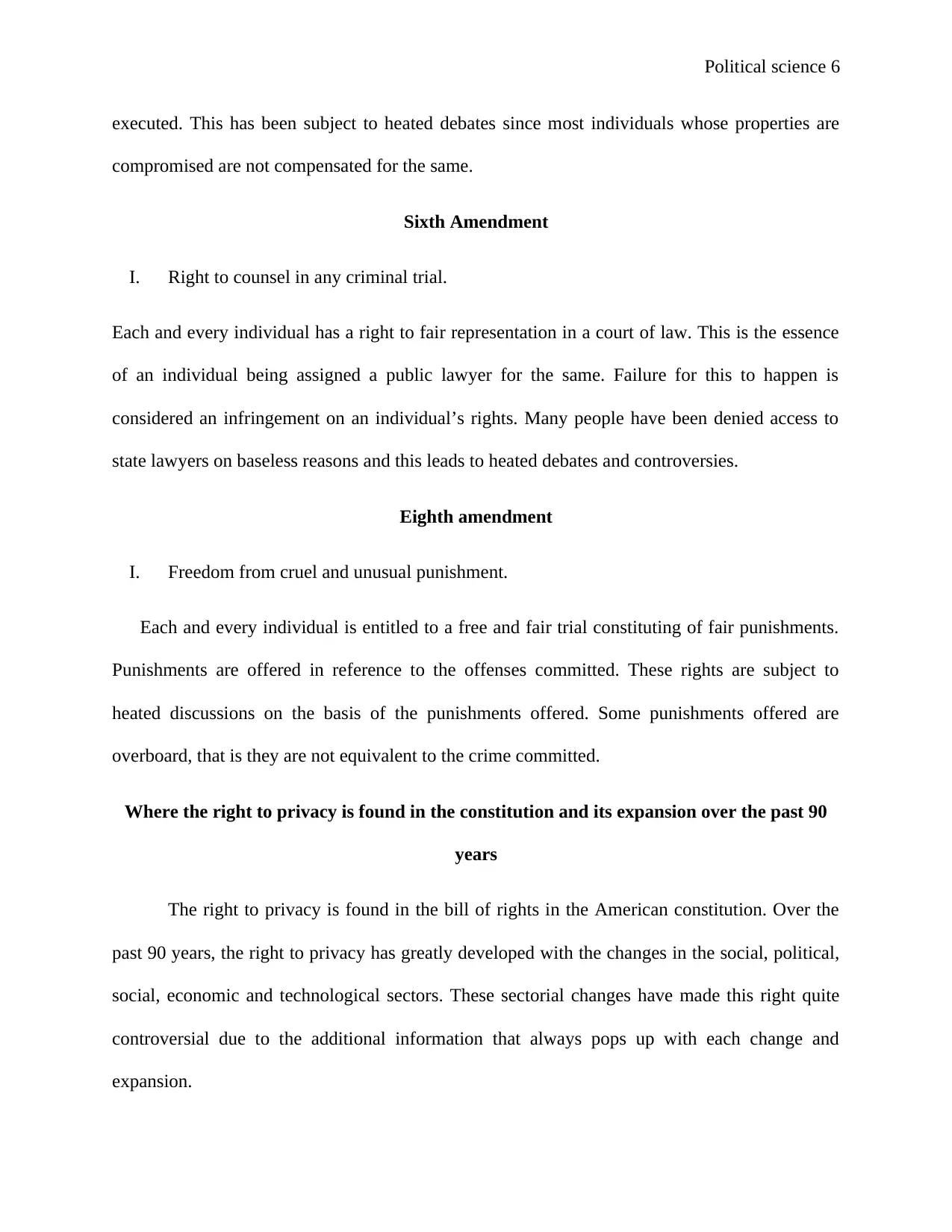
Political science 6
executed. This has been subject to heated debates since most individuals whose properties are
compromised are not compensated for the same.
Sixth Amendment
I. Right to counsel in any criminal trial.
Each and every individual has a right to fair representation in a court of law. This is the essence
of an individual being assigned a public lawyer for the same. Failure for this to happen is
considered an infringement on an individual’s rights. Many people have been denied access to
state lawyers on baseless reasons and this leads to heated debates and controversies.
Eighth amendment
I. Freedom from cruel and unusual punishment.
Each and every individual is entitled to a free and fair trial constituting of fair punishments.
Punishments are offered in reference to the offenses committed. These rights are subject to
heated discussions on the basis of the punishments offered. Some punishments offered are
overboard, that is they are not equivalent to the crime committed.
Where the right to privacy is found in the constitution and its expansion over the past 90
years
The right to privacy is found in the bill of rights in the American constitution. Over the
past 90 years, the right to privacy has greatly developed with the changes in the social, political,
social, economic and technological sectors. These sectorial changes have made this right quite
controversial due to the additional information that always pops up with each change and
expansion.
executed. This has been subject to heated debates since most individuals whose properties are
compromised are not compensated for the same.
Sixth Amendment
I. Right to counsel in any criminal trial.
Each and every individual has a right to fair representation in a court of law. This is the essence
of an individual being assigned a public lawyer for the same. Failure for this to happen is
considered an infringement on an individual’s rights. Many people have been denied access to
state lawyers on baseless reasons and this leads to heated debates and controversies.
Eighth amendment
I. Freedom from cruel and unusual punishment.
Each and every individual is entitled to a free and fair trial constituting of fair punishments.
Punishments are offered in reference to the offenses committed. These rights are subject to
heated discussions on the basis of the punishments offered. Some punishments offered are
overboard, that is they are not equivalent to the crime committed.
Where the right to privacy is found in the constitution and its expansion over the past 90
years
The right to privacy is found in the bill of rights in the American constitution. Over the
past 90 years, the right to privacy has greatly developed with the changes in the social, political,
social, economic and technological sectors. These sectorial changes have made this right quite
controversial due to the additional information that always pops up with each change and
expansion.
⊘ This is a preview!⊘
Do you want full access?
Subscribe today to unlock all pages.

Trusted by 1+ million students worldwide
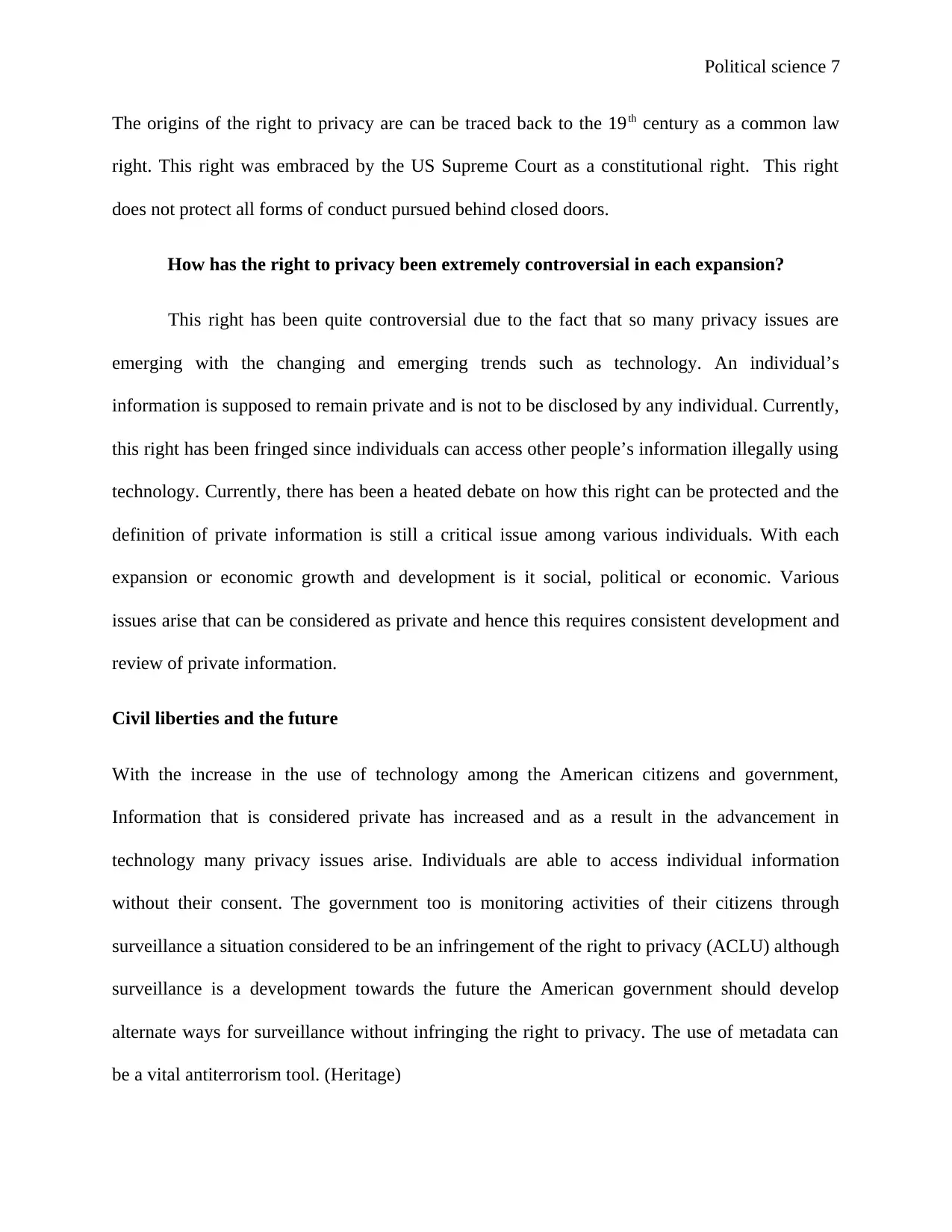
Political science 7
The origins of the right to privacy are can be traced back to the 19th century as a common law
right. This right was embraced by the US Supreme Court as a constitutional right. This right
does not protect all forms of conduct pursued behind closed doors.
How has the right to privacy been extremely controversial in each expansion?
This right has been quite controversial due to the fact that so many privacy issues are
emerging with the changing and emerging trends such as technology. An individual’s
information is supposed to remain private and is not to be disclosed by any individual. Currently,
this right has been fringed since individuals can access other people’s information illegally using
technology. Currently, there has been a heated debate on how this right can be protected and the
definition of private information is still a critical issue among various individuals. With each
expansion or economic growth and development is it social, political or economic. Various
issues arise that can be considered as private and hence this requires consistent development and
review of private information.
Civil liberties and the future
With the increase in the use of technology among the American citizens and government,
Information that is considered private has increased and as a result in the advancement in
technology many privacy issues arise. Individuals are able to access individual information
without their consent. The government too is monitoring activities of their citizens through
surveillance a situation considered to be an infringement of the right to privacy (ACLU) although
surveillance is a development towards the future the American government should develop
alternate ways for surveillance without infringing the right to privacy. The use of metadata can
be a vital antiterrorism tool. (Heritage)
The origins of the right to privacy are can be traced back to the 19th century as a common law
right. This right was embraced by the US Supreme Court as a constitutional right. This right
does not protect all forms of conduct pursued behind closed doors.
How has the right to privacy been extremely controversial in each expansion?
This right has been quite controversial due to the fact that so many privacy issues are
emerging with the changing and emerging trends such as technology. An individual’s
information is supposed to remain private and is not to be disclosed by any individual. Currently,
this right has been fringed since individuals can access other people’s information illegally using
technology. Currently, there has been a heated debate on how this right can be protected and the
definition of private information is still a critical issue among various individuals. With each
expansion or economic growth and development is it social, political or economic. Various
issues arise that can be considered as private and hence this requires consistent development and
review of private information.
Civil liberties and the future
With the increase in the use of technology among the American citizens and government,
Information that is considered private has increased and as a result in the advancement in
technology many privacy issues arise. Individuals are able to access individual information
without their consent. The government too is monitoring activities of their citizens through
surveillance a situation considered to be an infringement of the right to privacy (ACLU) although
surveillance is a development towards the future the American government should develop
alternate ways for surveillance without infringing the right to privacy. The use of metadata can
be a vital antiterrorism tool. (Heritage)
Paraphrase This Document
Need a fresh take? Get an instant paraphrase of this document with our AI Paraphraser
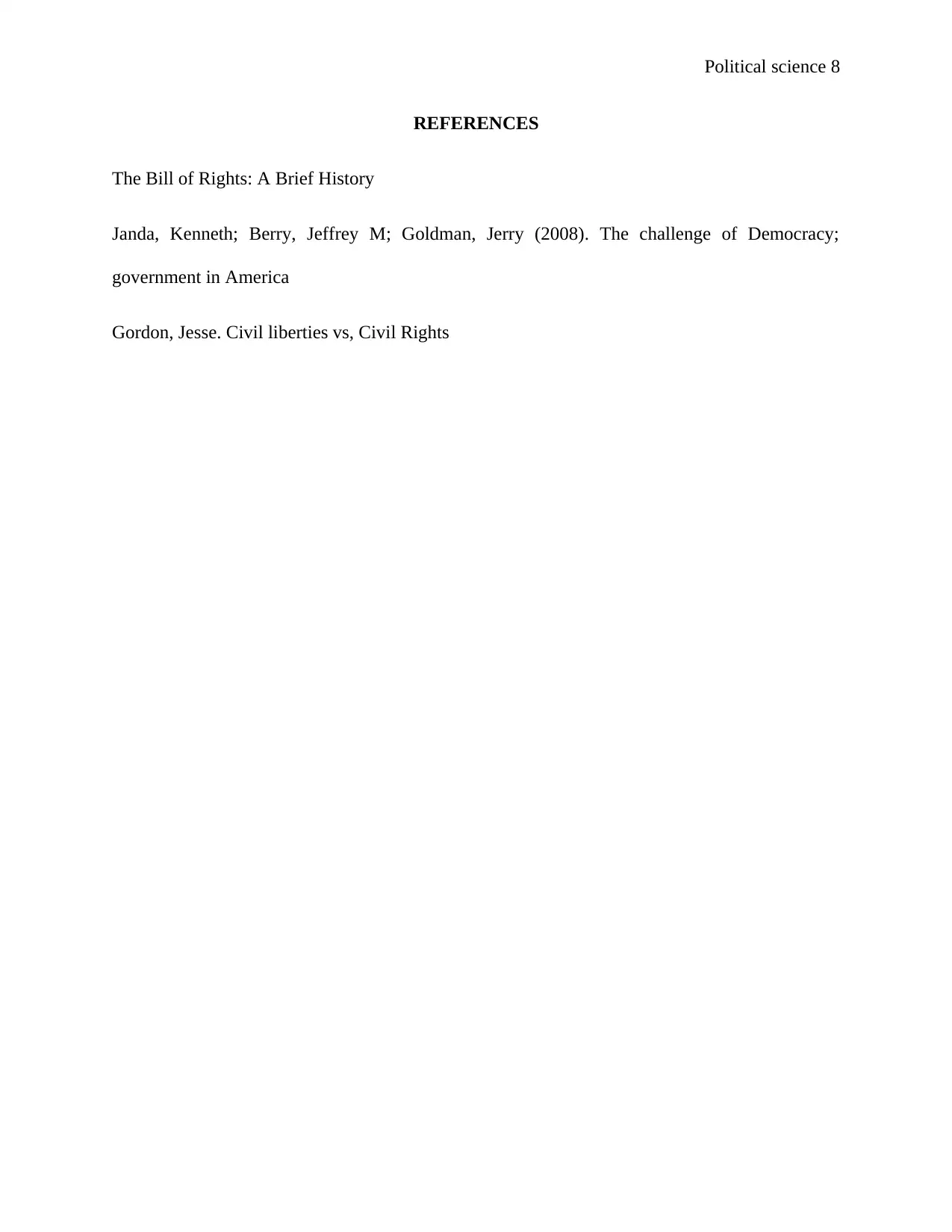
Political science 8
REFERENCES
The Bill of Rights: A Brief History
Janda, Kenneth; Berry, Jeffrey M; Goldman, Jerry (2008). The challenge of Democracy;
government in America
Gordon, Jesse. Civil liberties vs, Civil Rights
REFERENCES
The Bill of Rights: A Brief History
Janda, Kenneth; Berry, Jeffrey M; Goldman, Jerry (2008). The challenge of Democracy;
government in America
Gordon, Jesse. Civil liberties vs, Civil Rights
1 out of 8
Related Documents
Your All-in-One AI-Powered Toolkit for Academic Success.
+13062052269
info@desklib.com
Available 24*7 on WhatsApp / Email
![[object Object]](/_next/static/media/star-bottom.7253800d.svg)
Unlock your academic potential
Copyright © 2020–2025 A2Z Services. All Rights Reserved. Developed and managed by ZUCOL.




